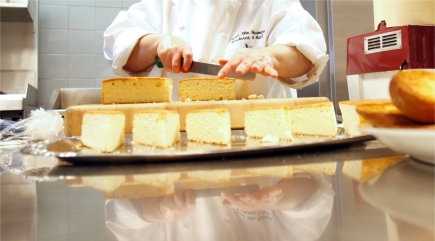
Renewing the Passion
Supporting the Vocational Calling of Catholic High School Teachers
Moments of Grace
From Where I’m Calling
October 09 2013

My friend Mark is a California chef. In the early 90s, before the Food Network and celebrity chefs, his restaurant in Napa Valley and his culinary skills were featured in Gourmet magazine.
Today he runs a breakfast café in Sonoma County, across from a city park, next to the tattoo shops. He says he left the high-end restaurant world in order to reclaim some order in his life.
“I work from seven to three and go home at night! How can you beat that?” he told me.
But Mark still brings his culinary A game to his breakfast café. Locals, blue-collar workers, vineyard crews, and tourists form a line that snakes out the front door and into the parking lot on weekend mornings. His menu is typical breakfast fare, but with gourmet goodies such as duck confit added to the mix.
Whenever my work takes me to San Francisco, I rent a car, drive 90 minutes north, and grab a seat at the counter in Mark’s cafe. One morning a few years back, I found Mark and his assistant Arturo experimenting.
“Braising goat,” Mark told me with a smile. “The Mexicans who work the vineyards love it. They tell me it reminds them of home.” Then he opened the oven and put some on my plate.
The next time I showed up, he and Arturo were experimenting with something they were going to serve at an upcoming black tie charity event.
“Deep-frying an egg still in the shell. A little tricky. Don’t want the egg inside the shell to get over- cooked,” he told me.
It is always like this with Mark. Constantly reaching outside the box, fully aware of the new things colleagues in his field are working on. His imagination still actively engaged with the cutting edge of his calling.
A few months ago, I made it back to Mark’s. There was a long line overflowing into the street.
“Forty-five minute wait,” said the hostess.
“How about the counter? It’s just me.”
“I’ll see what I can do.”
5 minutes later I was sitting at the counter in the midst of Saturday morning chaos. Happy chaos. Breakfast café chaos. Noise from friends talking at their tables. Noise of servers asking customers what they would like. Noise from the silverware and plates as diners dug into their meals.
It was loud.
The counter faces the flattop griddle, where Mark was filling orders. All I could see was his back as he bent over a pile of hash browns, simmering bacon and sausage (free range and local, of course), pancake batter, and eggs cooking three different ways.
Hanging all around him were those little rectangular tickets—pieces of paper that the servers scribble orders on and attach to shelf near the grill. He was surrounded by food that had to be cooked and plated perfectly.
For 15 minutes, I watched him. He didn’t know I was there.
The whole time, Mark never loses his temper. Never says anything harsh. He never drops or burns a thing.
Every ten seconds or so, he would turn from the griddle to announce the order that had been filled. The pace was crazy fast, yet I noticed that he took the time to garnish each plate with a strawberry or a slice of an orange before he turned it loose.
In the center of this chaos, he was neither distracted nor disturbed.
He never straightened up either. His back remained bent over the heat of his flattop griddle.
At that moment, he was far from the culinary cutting edge. The thrill of the extraordinary was replaced by the urgency of the ordinary.
Innovation was sitting this one out.
Execution was demanding every ounce of his attention.
At that moment, Gourmet magazine was irrelevant. All that mattered were the demands that engulfed him.
It wasn’t glamorous. But it was beautiful.
It wasn’t exciting. But it was noble.
I took a mental picture of this scene and have stored it in my memory box. I take it out now and again because it is a vocational gem.
This is more than a picture of a chef fulfilling breakfast orders.
It is us.
It is every teacher whose passion pushes them to master the art of their calling, but only as long as they are responsible enough to excel at the menial, mundane, demanding, and quite ordinary tasks that come with teaching.
Like Mark, we keep abreast of innovations in our chosen field—and occasionally put our professional toes in new water. We keep dreaming of better and more exciting ways to do things. Better methods. More exciting subject matter. New things to try. New ways to assess learning. More ways to make a contribution.
Often it is our ability to engage our professional imagination that keeps us healthy.
And like Mark, the bread and butter—or bacon and eggs—of our callings center around how well we attend to the basic and less exciting tasks of our profession.
I have not told Mark what I learned that day. But I will.
He eventually glanced at the counter and saw me. We had a conversation while he continued cooking and filling orders. When it was time to go, I moved to the end of the counter, closer to him.
Close enough to hug.
“Been watching you the whole time,” I said, shaking my head. “How do you handle it?”
“Sometimes,” he grinned, “you just have to hunker down and do the work.”

